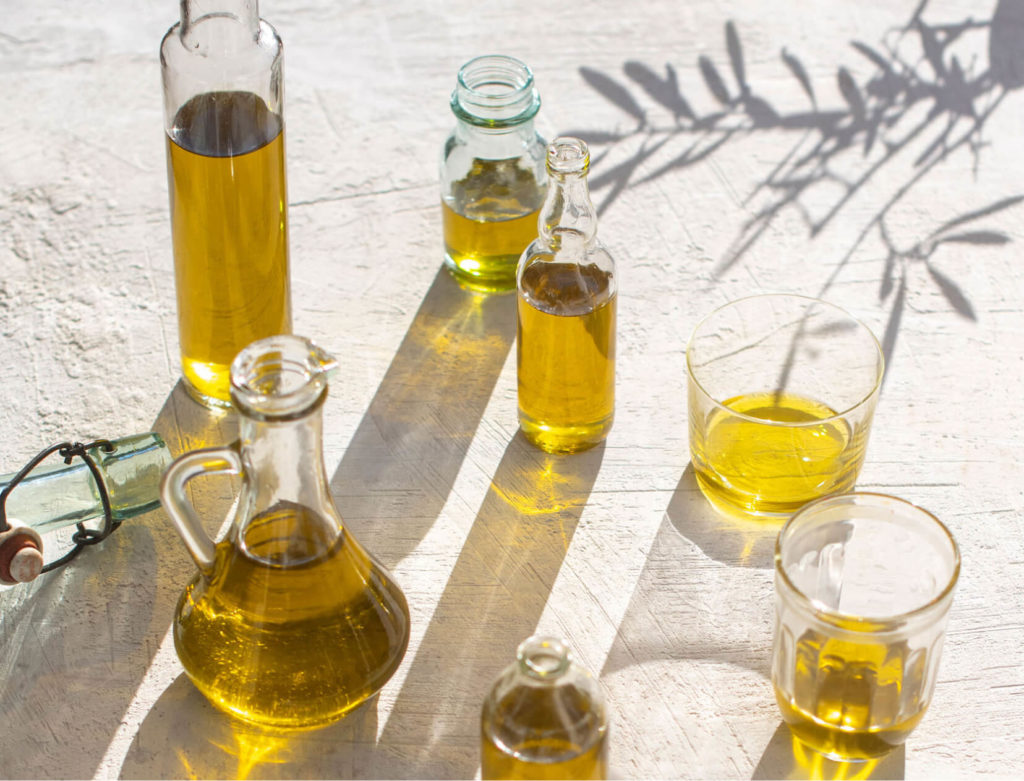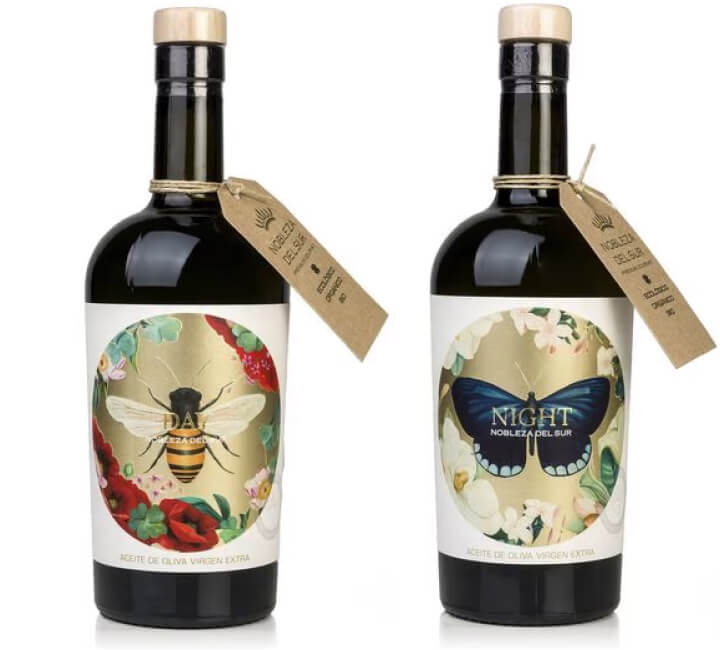

Supported by Science
Are Seed Oils Like Canola Unhealthy?
Are Seed Oils Like Canola Unhealthy?
June 9, 2022
Looking up “seed oils” in any search engine brings up claims that seed oils are inflammatory, are damaging to the gut, and contain undesirable components formed during refining processes. The crystal-clear refined oils from canola (rapeseed), grape-seed, corn, rice bran, safflower, soy, and sunflower seeds tend to be the ones included in this category.
Refined oils are not as desirable as the whole foods they were derived from. During the refining process, phytochemicals (plant compounds) with antioxidant and other desirable properties are lost, and small amounts of trans fats are formed. But a deep dive into the research has not turned up evidence that refined seed oils are doing us much harm.
I wasn’t surprised by this because I’ve kept an eye on the academic research on oils over the years, and oils have consistently been demonstrated to be healthier than other kinds of fats. The first research I carried out as an undergrad at Cal was on the health benefits of the polyunsaturated fats in oils. However, polyunsaturated fats do have a downside: They are prone to reacting with oxygen and becoming rancid. Later in my research career I discovered how oxidized fats contribute to inflammation in arteries. So it’s important to use seed oils properly to reap their benefits.
What has also been consistent over many years of research is that the fats suggested as substitutes for seed oils—coconut oil and dairy fats—have few health benefits and have well-demonstrated downsides.
So here are some claims around seed oils I’d like to delve into and—spoiler alert—argue against.
The Claims Against Seed Oils
-
Seed oils are bad for you.
-
Seed oils are inflammatory.
-
Seed oils become toxic to the human body.
-
Avoid oat milk containing rapeseed oil.
-
Coconut oil and butter are preferable to seed oils.
Some health practitioners may not agree with everything said here, but we all agree that whole foods like seeds, nuts, and avocado are the best ways to consume healthy fats. That way fats come along with fiber, vitamins, minerals, and antioxidants that keep the fats from becoming rancid. Are seed oils bad for you? Like most controversies in nutrition, the answer is: It depends on the context.
What’s There to Like About Seed Oils?
Seed oils contain the two polyunsaturated fatty acids that are essential nutrients, without which your skin would become thickened and scaly with rashes and, eventually, you would die. They are linoleic acid—an omega-6 fat that has been unjustly maligned—and the much-loved omega-3 fat, alpha-linolenic acid. Canola oil is a particularly rich source of omega-3 fat.
The fats in seed oils also bring benefits for cardiovascular health. These fats are mostly poly- and monounsaturated—and eating these types of fats lowers blood cholesterol. When people eat a canola oil–rich diet, their LDL cholesterol goes down. High blood cholesterol, together with inflammation, is a major cause of diseased arteries, so it makes sense that eating the kinds of fats found in seed oils reduces the risk of heart attacks.
And consuming fats from seed oils is associated with less inflammation. You may have heard the opposite—that seed oils are pro-inflammatory because of their omega-6 fats—but that does not appear to be the case. In multiple clinical studies, higher consumption of omega-6 fats from oils has been correlated with lower rates of inflammation. It turns out that the saturated fats in coconut oil and animal fats are linked to inflammation (more on this below).
Sometimes a little bit of canola oil is added to plant milks for extra creaminess, and that’s okay.
The heart-healthy, cholesterol-lowering, anti-inflammatory monounsaturated fat that’s in olive oil is oleic acid. Canola oil and high-oleic sunflower oil are also high in oleic acid. These oils are nice for baking—for example, in this recipe for Rye Happies, sweet bars with nuts, oats, and whole rye flour.
Sometimes a little bit of canola oil is added to plant milks for extra creaminess, and that’s okay. Canola is a natural variant of rapeseed—a relative of mustard—so the label may say rapeseed instead of canola. While much canola is genetically modified, non-GMO canola oil is readily available and you can find plant milks made with non-GMO canola. If you’d prefer full control over what’s in your plant milk, there are machines that simplify making a variety of plant milks at home.

Our Resident Chef on Cooking with Seed Oils
Caitlin O’Malley, our food director, explains smoke points, neutral taste, and why she sometimes chooses to cook with seed oils.
The majority of seed oils are what most cooks consider neutral oils. As the name suggests, they are mild in flavor. They also have a high smoke point—meaning that when heated, they do not smoke as readily as some fats. And for the most part, they can be used interchangeably, which is why many of our recipes simply call for “neutral oil.”
While we revere extra virgin olive oil for its robust flavor, you don’t always want an oil with robust flavor. Seed oils are functional cooking fats that can go unnoticed. They’re like the culinary equivalent of a wingman, stealthily making everyone else looks good. You’ll notice how moist your chocolate cake is, and you might even pick up on the secret ingredient (coffee), but you won’t taste the oil itself. You could decide that a mix of extra virgin olive oil and neutral oil is ideal for letting the lemon shine in your homemade aioli. A neutral oil can facilitate some high-heat wok cooking, but it won’t interfere with the flavors of the Shaoxing wine and Sichuan peppercorn in your mapo tofu.
While I don’t make vinaigrettes with canola oil or use peanut oil alongside fancy finishing salts as a garnish, neutral oils will always be useful for many other cooking jobs.
What’s There to Dislike About Seed Oils?
Seed oils may contain some oxidized and trans fats that are inflammatory. But digging deep into the evidence, it turns out that as far as inflammation, other fats may be more worrisome than seed oils.
Avoiding Inflammatory Fats
Three kinds of fats are inflammatory: trans fats, oxidized (rancid) fats, and saturated fats.
Trans fats
Small amounts of trans fats are formed from healthy unsaturated fats when oils are refined. They are also formed when oils are used for frying and are found naturally at low levels in animal fats (meat, dairy).
It’s clear from extensive research that consuming large amounts of trans fats raises blood cholesterol, causes inflammation, and increases the risk of heart attacks. Consumption of trans fats was quite low before 1911, when Proctor & Gamble invented partially hydrogenated oil and started selling it as Crisco shortening. Trans fats are formed when oil undergoes the chemical process called partial hydrogenation. Until partially hydrogenated oil was banned in the US in 2018, it was a common ingredient in snack foods, fried foods, commercial baked goods, and homemade piecrusts.
The amounts of trans fats in refined oils or animal fats are far lower than the amounts we consumed in fried foods and snacks prior to 2018. And we don’t have evidence that small amounts—a few grams—of trans fats have significant health effects, so avoiding trans fats completely is probably not necessary. If you did want to avoid them, you would need to give up not only refined oils but also butter, ghee, other dairy fats, meats, and fried foods.
Oxidized Fats
Oils become rancid after a while in the cupboard because fats are oxidized upon exposure to oxygen and heat. Polyunsaturated fats—omega-6 and particularly omega-3—are the most vulnerable to oxidation. It can happen during the refining process, on the shelf, in the frying pan, and in the body. In any case, oxidized fats are inflammatory and aren’t healthy for your arteries. Since most seed oils are rich in vulnerable polyunsaturated fats, they are best stored cold, not used repeatedly for deep frying, and consumed with plenty of antioxidant-rich vegetables.
However, fat profiles differ from one seed oil to another. Being quite rich in easily oxidized omega-3 fat, canola oil is not a good choice for frying. But high-oleic sunflower oil has a relatively low content of oxidation-prone fats, making it a reasonable choice for frying. Olive oil is another good choice for frying, as its oleic acid is relatively resistant to oxidation. But it’s not impervious: If you notice an off smell to that olive oil that’s been in the cupboard for many months, replace it with a fresh bottle.
Saturated Fats
The major type of dietary fat linked with inflammation is saturated fat, such as the fat in coconut oil and animal products. Saturated fat, particularly the type found in coconut oil, can turn on the expression of inflammatory genes. In one clinical study, people eating butter had higher inflammation than people eating sunflower oil.
If inflammation is the concern, the evidence points to eating less coconut oil and butter rather than avoiding oils. Another reason to go easy on saturated fats is that they increase blood cholesterol.
Depleted Nutrient Content
The crystal-clear oils we buy have been refined and beneficial compounds have been removed. There is more plant goodness in unrefined oils such as extra-virgin olive oil (EVOO). And the antioxidants in EVOO protect the fats from heat, so if it weren’t so expensive, it would be a decent cooking oil, regardless of smoke point.
Conclusions
-
The research does not support the hypothesis that avoiding seed oils—such as canola, corn, and sunflower—and substituting butter and coconut oil has health benefits.
-
Seed oils contain healthy fats that are essential nutrients, lower blood cholesterol, and are less inflammatory than other fats. But they are prone to being oxidized.
-
Saturated fats in dairy products, red meat, and coconut are resistant to oxidation, so lard, butter, and coconut oil are useful for cooking. But these fats are inflammatory and cause blood cholesterol to go up.
-
To reduce consumption of inflammatory trans, oxidized, and saturated fats, eat less fried food and animal fat and cook with olive oil or high-oleic sunflower oil.
Healthy Oils, Gut Support, and a Plant-Milk Maker
-
goop Wellness
GUT MICROBIOME SUPERPOWDER
goop, $58/$50 with subscriptionIf gut health is a concern, this unflavored powder provides a multipronged approach to supporting digestion and the breakdown of irritating proteins, alleviating occasional bloating, and promoting normal elimination.*
SHOP NOW -
Nobleza Del Sur
NIGHT – ORGANIC EXTRA VIRGIN OLIVE OIL,
DAY – ORGANIC EXTRA VIRGIN OLIVE OIL
goop, $42 eachThese organic EVOOs are from Andalusia, Spain. Day is a little more herbal; Night, a little sweeter. Both are wonderful.
SHOP NOW -
Baroncini Import & Co.
SICILIAN EXTRA VIRGIN OLIVE OIL
goop, $60Fresh and balanced, this three-liter can of EVOO is made for serious cooking and eating.
SHOP NOW -
ChefWave
MILKMADE NON-DAIRY MILK MAKER
goop, $250You can have the creaminess and superior taste of freshly made plant milks without the labor. Just grab some nuts or oats and push start.
SHOP NOW -
Simris
ALGAE OMEGA-3
goop, $55These vegan omega-3 softgels contain omega-3 fatty acids—DHA, EPA, and ALA—for heart, immune, brain, and skin health.*
SHOP NOW
Related Reading on goop
Ask Denise: Is Fish or Algal Oil the Best Source of Omega-3 Fats?
This article is for informational purposes only. It is not, nor is it intended to be, a substitute for professional medical advice, diagnosis, or treatment and should never be relied upon for specific medical advice. To the extent that this article features the advice of physicians or medical practitioners, the views expressed are the views of the cited expert and do not necessarily represent the views of goop.
*These statements have not been evaluated by the Food and Drug Administration. These products are not intended to diagnose, treat, cure, or prevent any disease.






